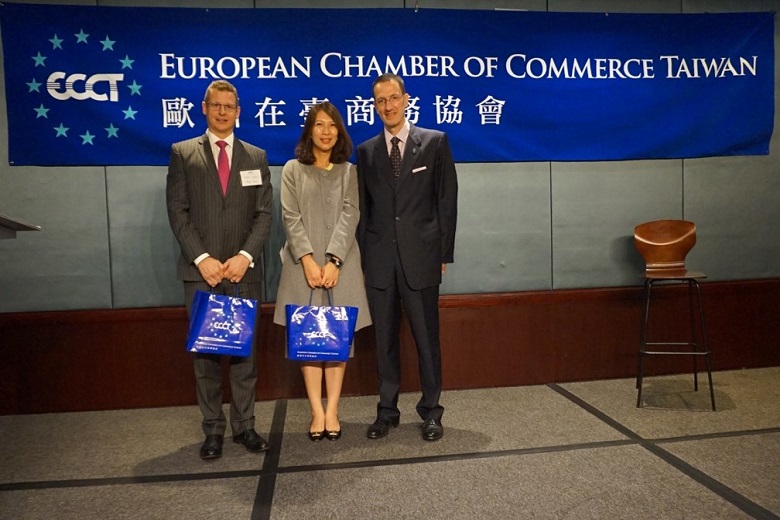Michael Page Taiwan Salary Benchmark 2020 report launch

In his presentation, Tibbatts gave and overview of industry trends and some highlights of the report while Claire Wu gave some in-depth details of trends in specific industry sectors. Tibbatts noted that Taiwan was the best performing country in the region in the Michael Page group, this year, with a 30% growth in job placements from the previous year.The report notes that Taiwan will experience fierce competition for talent in the key progress areas of digital, engineering, technology and data in 2020. In addition, as the market experiences a net brain drain to mainland China, Taiwan will continue to witness a candidate-driven hiring landscape.
According to Michael Page's job applicant confidence index, published in the report, 63% of job applicants in Taiwan are inclined to work overseas in 2020. The report also shows that professionals in Taiwan are very confident. 70% of them believe they will take less than three months to find a new job, 94% foresee themselves having better career progression in 2020 and 81% are positive about the job market.
Other insights from the report in terms of what the Taiwan workforce is thinking show that 66% of applicants feel they have maximum autonomy at work, 61% rate their contributions as meaningful while 82% of professionals in Taiwan believe that they work in a harmonious workplace (described as having the characteristics of collaborative, problem solving and accountability). However, 24% of professionals feel that their company is behind in digital transformation.
Thinking tends to differ based on generation. Generation Xers (born in the 1960s and 70s) regard conflict management, change management and stress management as the most important soft skills while Generation Y (also known as millennials, born in the late 70s and 80s) regard communications skills, building relationships as the most important soft skills and are much more concerned about having a healthy work-life balance. Generation Xers tend to KPI-driven while millennials desire a collaborative environment.
Employers need to pay attention to this generational shift in attitudes towards work if they are to attract and retain the best talent. A particular characteristic of the millennial generation is that money is no longer the most important thing. According to Michael Page, 64% of applicants do not consider unsatisfactory monetary benefits as the top decision to leave their job. Instead, the top factors cited for saying goodbye are an unhealthy work culture and because they feel that their skills and abilities are not put to good use. While this does not mean that money is not important, other factors may be more important, especially to the next generation. In addition, Generation Y and Zers tend to demand much more transparent career paths as well as more frequent recognition and rewards. To retain talented young individuals, companies would therefore do well to consider offering more regular performance-based rewards and promotions (even if it requires adding layers to a company's hierarchical structure for this purpose).
According to Tibbatts, while people from Generation Z are still too young for most of the management positions it fills, research conducted by Michael Page indicate that this generation wants all the same things as Generation Y and may be even more demanding in expecting their employers to be actively engaged in trying to improve the world. Companies have to cater to the needs and desires of all three generations if they are to succeed.
According to the report, while Taiwan is not immune to the adverse international conditions from a trade and market volatility perspective, there are several hiring bright spots. Technology, in particular looks promising given buoyancy for software development, online gaming start-ups, app development and other developer-driven sectors.
This is affirmed by big brands in technology increasing their investments in Taiwan. Google announced plans to double its office space in 2020, while Amazon and Microsoft have confirmed plans to expand their research and development centres in Taiwan. According to Tibbatts, this indicates great confidence in Taiwan's R&D ability and that these investments are likely to spur investments from other companies.
Other findings from the report reveal exponential growth of digitalisation across industries. With increased digital transformation efforts, the financial services sector is expected to decrease their hiring in back office positions as the functions are either replaced by artificial intelligence (AI) or outsourced.
Advancements in healthcare are also driven by the increasing adoption of home-based sensors, robotics and AI-enabled home health monitoring platforms. This will boost hiring needs in the future which combine both healthcare and technology expertise.
According to Claire Wu, the group is also seeing positive signs from Taiwan's traditionally strong sectors, such as engineering, while semiconductors, renewable energy as well as healthcare & life sciences continue to look promising. She also noted encouraging signs of manufacturing activity returning to Taiwan while hiring managers in financial services sound confident, particularly as Taiwan remains a relatively high-skill and low-cost business location.
The year ahead will see continued advancement of AI, Internet of Things and 5G wireless communications. Therefore all experts in these fields will be sought after by companies. Taiwan's start-ups are also on the road to consolidation within the e-commerce, C2C platforms, streaming as well as AI SaaS solutions spaces.
In addition, DevOps is earmarked to have a milestone year as an increased number of companies from various industries implement cloud platform into their software development processes and the importance of micro services rise.
According to the report, candidates skilled in technology can command an average 15% salary increase when switching jobs within similar industries.
